Hannes Strass
Non-Monotonic S4F Standpoint Logic (Extended Version with Proofs)
Nov 16, 2025Abstract:Standpoint logics offer unified modal logic-based formalisms for representing multiple heterogeneous viewpoints. At the same time, many non-monotonic reasoning frameworks can be naturally captured using modal logics, in particular using the modal logic S4F. In this work, we propose a novel formalism called S4F Standpoint Logic, which generalises both S4F and standpoint propositional logic and is therefore capable of expressing multi-viewpoint, non-monotonic semantic commitments. We define its syntax and semantics and analyze its computational complexity, obtaining the result that S4F Standpoint Logic is not computationally harder than its constituent logics, whether in monotonic or non-monotonic form. We also outline mechanisms for credulous and sceptical acceptance and illustrate the framework with an example.
A Farewell to Harms: Risk Management for Medical Devices via the Riskman Ontology & Shapes
May 22, 2024



Abstract:We introduce the Riskman ontology & shapes for representing and analysing information about risk management for medical devices. Risk management is concerned with taking necessary precautions so a medical device does not cause harms for users or the environment. To date, risk management documentation is submitted to notified bodies (for certification) in the form of semi-structured natural language text. We propose to use classes from the Riskman ontology to logically model risk management documentation and to use the included SHACL constraints to check for syntactic completeness and conformity to relevant standards. In particular, the ontology is modelled after ISO 14971 and the recently published VDE Spec 90025. Our proposed methodology has the potential to save many person-hours for both manufacturers (when creating risk management documentation) as well as notified bodies (when assessing submitted applications for certification), and thus offers considerable benefits for healthcare and, by extension, society as a whole.
Risk Management for Medical Devices via the Riskman Ontology & Shapes
May 16, 2024



Abstract:We introduce the Riskman ontology & shapes for representing and analysing information about risk management for medical devices. Risk management is concerned with taking necessary precautions so a medical device does not cause harms for users or the environment. To date, risk management documentation is submitted to notified bodies (for certification) in the form of semi-structured natural language text. We propose to use classes from the Riskman ontology to logically model risk management documentation and to use the included SHACL constraints to check for syntactic completeness and conformity to relevant standards. In particular, the ontology is modelled after ISO 14971 and the recently published VDE Spec 90025. Our proposed methodology has the potential to save many person-hours for both manufacturers (when creating risk management documentation) as well as notified bodies (when assessing submitted applications for certification), and thus offers considerable benefits for healthcare and, by extension, society as a whole.
Pushing the Boundaries of Tractable Multiperspective Reasoning: A Deduction Calculus for Standpoint EL+
May 11, 2023
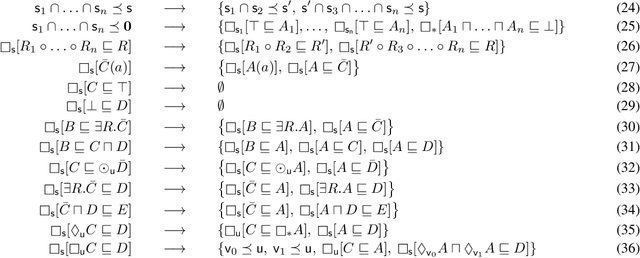
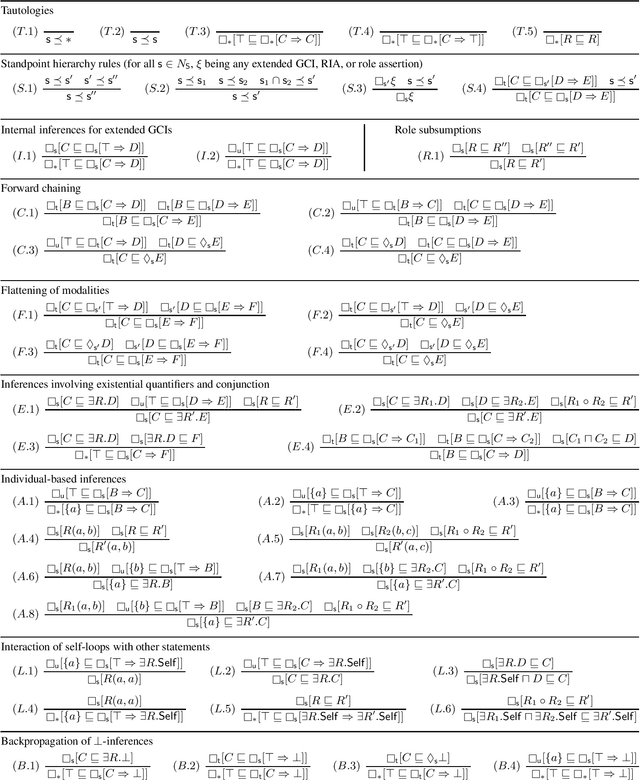
Abstract:Standpoint EL is a multi-modal extension of the popular description logic EL that allows for the integrated representation of domain knowledge relative to diverse standpoints or perspectives. Advantageously, its satisfiability problem has recently been shown to be in PTime, making it a promising framework for large-scale knowledge integration. In this paper, we show that we can further push the expressivity of this formalism, arriving at an extended logic, called Standpoint EL+, which allows for axiom negation, role chain axioms, self-loops, and other features, while maintaining tractability. This is achieved by designing a satisfiability-checking deduction calculus, which at the same time addresses the need for practical algorithms. We demonstrate the feasibility of our calculus by presenting a prototypical Datalog implementation of its deduction rules.
Automated reasoning support for Standpoint-OWL 2
Apr 30, 2023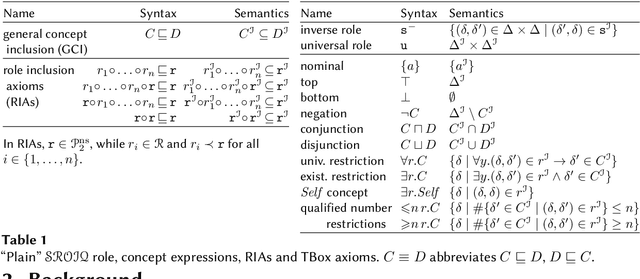
Abstract:We present a tool for modelling and reasoning with knowledge from various diverse (and possibly conflicting) viewpoints. The theoretical underpinnings are provided by enhancing base logics by standpoints according to a recently introduced formalism that we also recall. The tool works by translating the standpoint-enhanced version of the description logic SROIQ to its plain (i.e. classical) version. Existing reasoners can then be directly used to provide automated support for reasoning about diverse standpoints.
Tractable Diversity: Scalable Multiperspective Ontology Management via Standpoint EL
Feb 25, 2023Abstract:The tractability of the lightweight description logic EL has allowed for the construction of large and widely used ontologies that support semantic interoperability. However, comprehensive domains with a broad user base are often at odds with strong axiomatisations otherwise useful for inferencing, since these are usually context-dependent and subject to diverging perspectives. In this paper we introduce Standpoint EL, a multi-modal extension of EL that allows for the integrated representation of domain knowledge relative to diverse, possibly conflicting standpoints (or contexts), which can be hierarchically organised and put in relation to each other. We establish that Standpoint EL still exhibits EL's favourable PTime standard reasoning, whereas introducing additional features like empty standpoints, rigid roles, and nominals makes standard reasoning tasks intractable.
How to Agree to Disagree: Managing Ontological Perspectives using Standpoint Logic
Jun 14, 2022
Abstract:The importance of taking individual, potentially conflicting perspectives into account when dealing with knowledge has been widely recognised. Many existing ontology management approaches fully merge knowledge perspectives, which may require weakening in order to maintain consistency; others represent the distinct views in an entirely detached way. As an alternative, we propose Standpoint Logic, a simple, yet versatile multi-modal logic ``add-on'' for existing KR languages intended for the integrated representation of domain knowledge relative to diverse, possibly conflicting standpoints, which can be hierarchically organised, combined and put in relation to each other. Starting from the generic framework of First-Order Standpoint Logic (FOSL), we subsequently focus our attention on the fragment of sentential formulas, for which we provide a polytime translation into the standpoint-free version. This result yields decidability and favourable complexities for a variety of highly expressive decidable fragments of first-order logic. Using some elaborate encoding tricks, we then establish a similar translation for the very expressive description logic SROIQb_s underlying the OWL 2 DL ontology language. By virtue of this result, existing highly optimised OWL reasoners can be used to provide practical reasoning support for ontology languages extended by standpoint modelling.
Weighted Abstract Dialectical Frameworks: Extended and Revised Report
Sep 07, 2018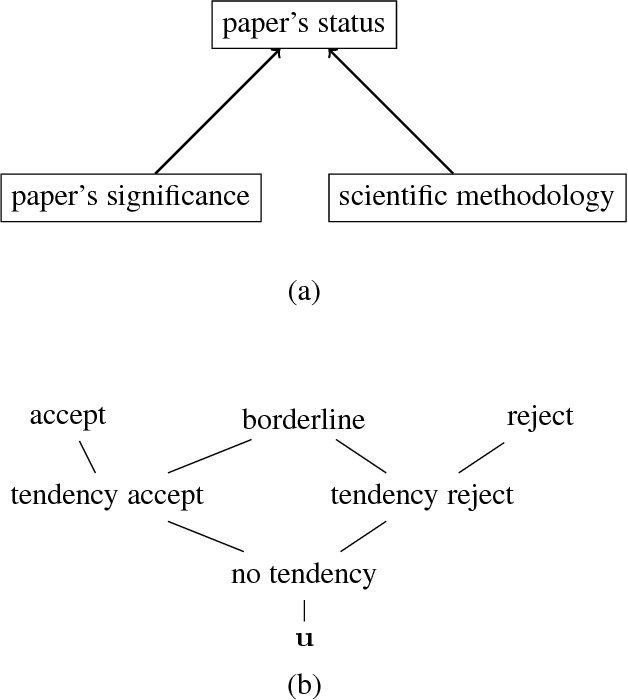
Abstract:Abstract Dialectical Frameworks (ADFs) generalize Dung's argumentation frameworks allowing various relationships among arguments to be expressed in a systematic way. We further generalize ADFs so as to accommodate arbitrary acceptance degrees for the arguments. This makes ADFs applicable in domains where both the initial status of arguments and their relationship are only insufficiently specified by Boolean functions. We define all standard ADF semantics for the weighted case, including grounded, preferred and stable semantics. We illustrate our approach using acceptance degrees from the unit interval and show how other valuation structures can be integrated. In each case it is sufficient to specify how the generalized acceptance conditions are represented by formulas, and to specify the information ordering underlying the characteristic ADF operator. We also present complexity results for problems related to weighted ADFs.
Proceedings of the First International Workshop on Argumentation in Logic Programming and Non-Monotonic Reasoning
Nov 08, 2016

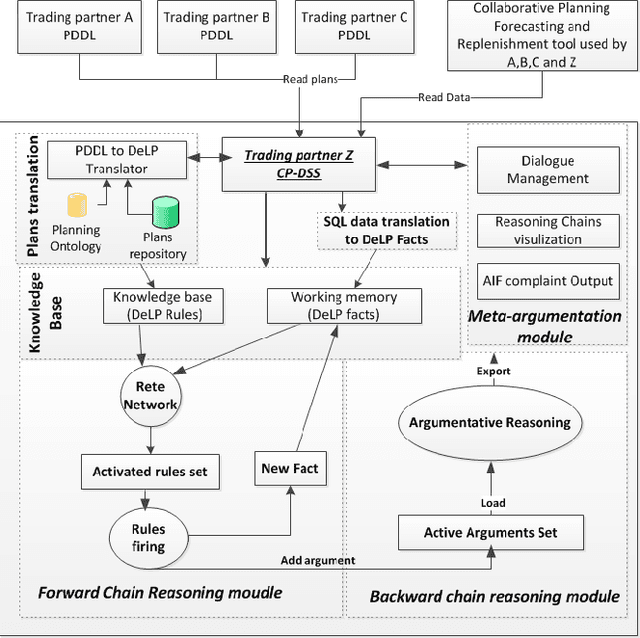
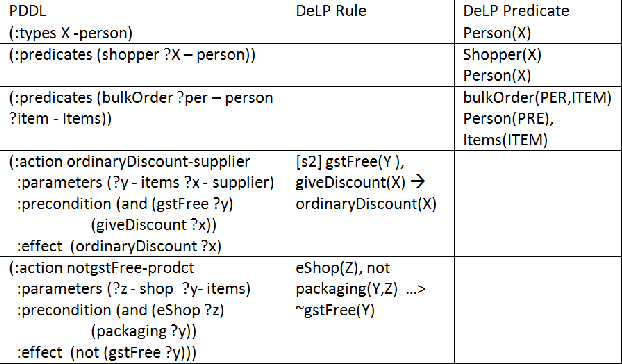
Abstract:This volume contains the papers presented at Arg-LPNMR 2016: First International Workshop on Argumentation in Logic Programming and Nonmonotonic Reasoning held on July 8-10, 2016 in New York City, NY.
Characterizing Realizability in Abstract Argumentation
Mar 31, 2016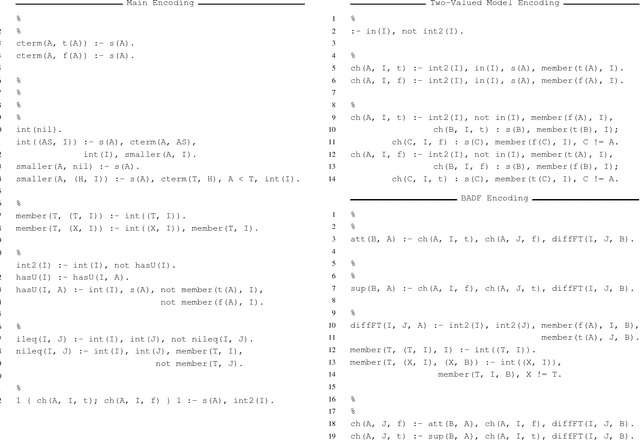
Abstract:Realizability for knowledge representation formalisms studies the following question: given a semantics and a set of interpretations, is there a knowledge base whose semantics coincides exactly with the given interpretation set? We introduce a general framework for analyzing realizability in abstract dialectical frameworks (ADFs) and various of its subclasses. In particular, the framework applies to Dung argumentation frameworks, SETAFs by Nielsen and Parsons, and bipolar ADFs. We present a uniform characterization method for the admissible, complete, preferred and model/stable semantics. We employ this method to devise an algorithm that decides realizability for the mentioned formalisms and semantics; moreover the algorithm allows for constructing a desired knowledge base whenever one exists. The algorithm is built in a modular way and thus easily extensible to new formalisms and semantics. We have also implemented our approach in answer set programming, and used the implementation to obtain several novel results on the relative expressiveness of the abovementioned formalisms.
 Add to Chrome
Add to Chrome Add to Firefox
Add to Firefox Add to Edge
Add to Edge